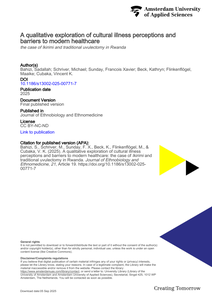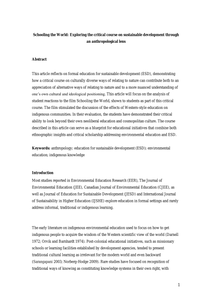Indigenous rights’ relationship to ecological justice in Amazonia has not been explicitly explored in the literature. As social scientists rarely talk about violence against non-humans, this case study of conservation in Amazonia will explore this new area of concern. Ethical inquiries in conservation also engage with the manifold ways through which human and nonhuman lives are entangled and emplaced within wider ecological relationships, converging in the notion of environmental justice, which often fails to account for overt violence or exploitation of non-humans. Reflecting on this omission, this chapter discusses the applicability of engaged social science and conservation to habitat destruction in Amazonia, and broader contexts involving violence against non-humans. The questions addressed in this chapter are: is the idea of ecological justice sufficiently supported in conservation debate, and more practical Amazonian contexts? Can advocacy of inherent rights be applied to the case of non-humans? Can indigenous communities still be considered 'traditional' considering population growth and increased consumptive practices? Concluding that the existing forms of justice are inadequate in dealing with the massive scale of non-human abuse, this chapter provides directions for conservation that engage with deep ecology and ecological justice in the Amazonian context. doi: 10.1007/978-3-030-29153-2 LinkedIn: https://www.linkedin.com/in/helenkopnina/
MULTIFILE

This paper puts forward a conceptual framework to analyse emergence and the development of planned knowledge locations in cities (science and technology parks, creative factories, knowledge hubs, etc.). It argues that the study and the practice of developing these precincts can benefit from explicitly considering the broader territorial context, the time dynamics and the co-evolutionary processes through which they unfold. The advantages of such as framework are illustrated with the support of two European knowledge locations: Arabianranta (Helsinki, Finland) and Biocant (Cantanhede, Portugal).
DOCUMENT

BackgroundUnderstanding cultural perceptions of illness is crucial for effective healthcare delivery. This study examines the ethnomedical concept of ikirimi, a culturally recognized illness in Rwanda characterized by perceived uvula abnormalities, and its traditional management through uvulectomy. This study explores the cultural understanding of ikirimi, its perceived causes, symptoms, and treatments, as well as barriers to integrating modern healthcare.MethodsAn exploratory qualitative approach was employed, involving in-depth semi-structured interviews with eight participants: traditional healers, individuals who underwent traditional uvulectomy, and healthcare providers. A grounded theory approach which analyzes data in systematic manner to generate new theories was applied, with coding conducted in English after initial transcription and analysis in Ikinyarwanda to preserve Indigenous concepts.ResultsParticipants described ikirimi as an illness affecting the uvula (named as akamironko or akamirabugari or agashondabugari in Ikinyarwanda), characterized by swelling, elongation, and pus-like discoloration. Reported symptoms included fever, difficulty swallowing, coughing, and weakness, with children identified as the most affected group. Traditional healers diagnosed ikirimi through visual inspection of uvular morphology and movement and treated it by cutting the affected part of uvula and is known as guca Ikirimi ‘traditional uvulectomy’. Barriers to integrating modern healthcare included skepticism about biomedical care, judgmental attitudes from providers, and communication gaps. Despite the prevalence of ikirimi, its biomedical correlates remain unclear, though participants associated it with severe throat illnesses such as tonsillopharyngitis.ConclusionThe findings highlight ikirimi as a socially constructed illness with deep cultural roots, significant health implications, and persistent barriers to modern healthcare. Addressing these barriers requires culturally sensitive approaches that integrate Indigenous knowledge with biomedical practices. Future research should explore the biomedical correlates of ikirimi and foster collaboration between traditional and modern healthcare systems to improve patient outcomes.
DOCUMENT

This book explores inspirational entrepreneurial activities in the tourism industry of Ladakh, India. It particularly looks at ways to develop an entrepreneurial yet environment-friendly tourist destination. The book starts off with in-depth historical reflections of entrepreneurship and tourism in one of India’s fastest growing tourist destinations. Subsequently, the book studies the unique entrepreneurial challenges and opportunities in Ladakh’s extreme resource-scarcity and remote context based on empirical evidence from entrepreneurs and stakeholders in the tourism industry. In addition, a broad overview of contemporary entrepreneurial activities in the tourism industry in Ladakh is presented, underscoring the importance of indigenous knowledge and cultural traditions for developing sustainable tourism. Based on qualitative data analyses and literature reflections, this book provides scholars, students, professionals and policymakers an alternative view on entrepreneurial activities in the tourism industry of an ecologically jeopardized region.
MULTIFILE
This chapter addresses environmental education as an important subject of anthropological inquiry and demonstrates how ethnographic research can contribute to our understanding of environmental learning both in formal and informal settings. Anthropology of environmental education is rich in ethnographies of indigenous knowledge of plants and animals, as well as emotional and religious engagement with nature passed on through generations. Aside from these ethnographies of informal environmental education, anthropological studies can offer a critical reflection on the formal practice of education, especially as it is linked to development in non-Western countries. Ethnographic and critical studies of environmental education will be discussed as one of the most challenging directions of environmental anthropology of the future. This is an Accepted Manuscript of a book chapter published by Routledge/CRC Press in "Environmental Anthropology: Future Directions" on 7/18/13 available online: https://doi.org/10.4324/9780203403341 LinkedIn: https://www.linkedin.com/in/helenkopnina/
MULTIFILE

Purpose: This study aimed to determine the motivations of a select group of South Africans in terms of their potential engagement with cultural tourism; more specifically, the study set out to show whether these motivations influence the cultural activities that the tourists want to participate in and whether their interest in specific cultural activities determines their destination choices. Furthermore, the mediating role of activities in the relationship between cultural motivations and destination choice was also assessed. Design/methodology/approach: An online panel survey collected responses from 1,530 potential cultural tourists across South Africa. Hypotheses were tested, using structural equation modelling. Findings: The results show that tourists' motivations for cultural tourism influence their likelihood of participating in specific cultural activities. Cultural tourism is shown to be influenced by more than learning and includes entertainment, relaxation, novelty and escape dimensions. There also seems to be a difference in the activities engaged in by destination type. For example, tourists likely to take part in indigenous cultural tourism activities are more likely to do so at hedonic destinations. Practical implications: This paper contributes to the understanding of cultural tourism activities, aiding destinations in attracting cultural tourists. Destinations need to develop activities that match visitor motivations, increase satisfaction and encourage visitors to return. Originality/value: The paper increases the understanding of cultural tourism in South Africa and underlines the importance of communities in providing distinctive tourism activities. The study also has an important social dimension, highlighting the role of social status in cultural tourism consumption and destination selection.
MULTIFILE
BackgroundPeople from lower and middle socioeconomic classes and vulnerable populations are among the worst affected by the COVID-19 pandemic, thus exacerbating disparities and the digital divide.ObjectiveTo draw a portrait of e-services as a digital approach to support digital health literacy in vulnerable populations amid the COVID-19 infodemic, and identify the barriers and facilitators for their implementation.MethodsA scoping review was performed to gather published literature with a broad range of study designs and grey literature without exclusions based on country of publication. A search was created in Medline (Ovid) in March 2021 and translated to Medline, PsycINFO, Scopus and CINAHL with Full Text (EBSCOhost). The combined literature search generated 819 manuscripts. To be included, manuscripts had to be written in English, and present information on digital intervention(s) (e.g. social media) used to enable or increase digital health literacy among vulnerable populations during the COVID-19 pandemic (e.g. older adults, Indigenous people living on reserve).ResultsFive articles were included in the study. Various digital health literacy-enabling e-services have been implemented in different vulnerable populations. Identified e-services aimed to increase disease knowledge, digital health literacy and social media usage, help in coping with changes in routines and practices, decrease fear and anxiety, increase digital knowledge and skills, decrease health literacy barriers and increase technology acceptance in specific groups. Many facilitators of digital health literacy-enabling e-services implementation were identified in expectant mothers and their families, older adults and people with low-income. Barriers such as low literacy limited to no knowledge about the viruses, medium of contamination, treatment options played an important role in distracting and believing in misinformation and disinformation. Poor health literacy was the only barrier found, which may hinder the understanding of individual health needs, illness processes and treatments for people with HIV/AIDS.ConclusionsThe literature on the topic is scarce, sparse and immature. We did not find any literature on digital health literacy in Indigenous people, though we targeted this vulnerable population. Although only a few papers were included, two types of health conditions were covered by the literature on digital health literacy-enabling e-services, namely chronic conditions and conditions that are new to the patients. Digital health literacy can help improve prevention and adherence to a healthy lifestyle, improve capacity building and enable users to take the best advantage of the options available, thus strengthening the patient’s involvement in health decisions and empowerment, and finally improving health outcomes. Therefore, there is an urgent need to pursue research on digital health literacy and develop digital platforms to help solve current and future COVID-19-related health needs.
DOCUMENT

This article reflects on formal education for sustainable development (ESD), demonstrating how critical course on culturally diverse ways of relating to nature can contribute both to an appreciation of alternative ways of relating to nature and to a more nuanced understanding of one's own cultural and ideological positioning. This article will focus on the analysis of student reactions to the film Schooling the World, shown to students as part of this critical course. The film stimulated the discussion of the effects of Western-style education on indigenous communities. In their evaluation, the students have demonstrated their critical ability to look beyond their own neoliberal education and cosmopolitan culture. The course described in this article can serve as a blueprint for educational initiatives that combine both ethnographic insights and critical scholarship addressing environmental education and ESD. https://doi.org/10.1016/j.ijer.2013.10.002 https://www.linkedin.com/in/helenkopnina/
MULTIFILE

By supporting creation of protected areas, conservation projects are known to bring economic prosperity to the local communities, but also incite criticism. A common theme in the critique of conservation organizations is the proximity to neoliberal agencies seeking to capitalize on environment, which disadvantage the local communities. Community participation has been proposed as a panacea for neoliberal conservation. However, conservation efficacy is not always contingent on the community involvement and reliance on ‘traditional’ practices in protected areas has not always benefitted biodiversity. Simultaneously, critique of conservation ignores evidence of indigenous activism as well as alternative forms of environmentalism which provide a broader ethical support base for conservation. This article highlights the challenges and contradictions, as well as offers hopeful directions in order to more effectively ground compassionate conservation. https://doi.org/10.1080/23251042.2015.1048765 https://www.linkedin.com/in/helenkopnina/
MULTIFILE
